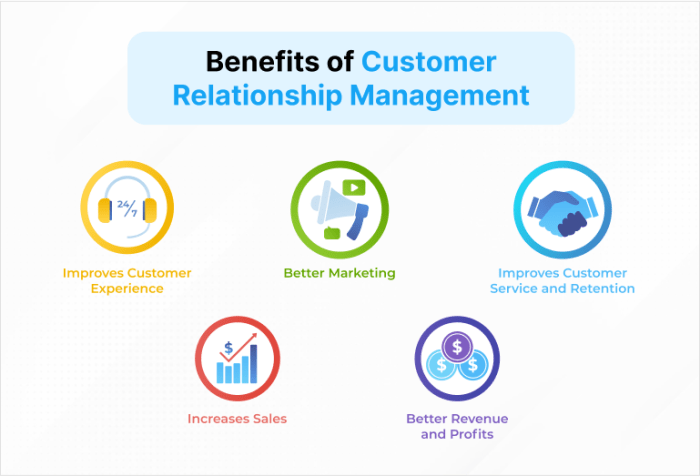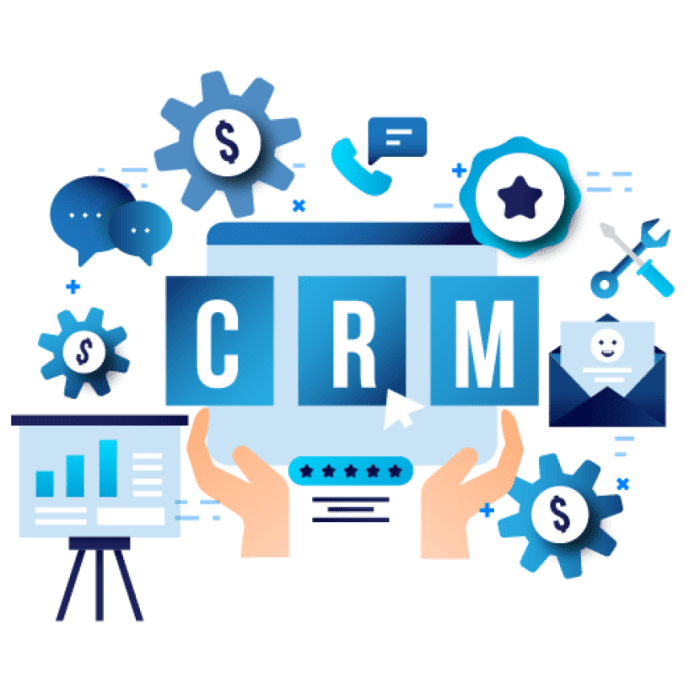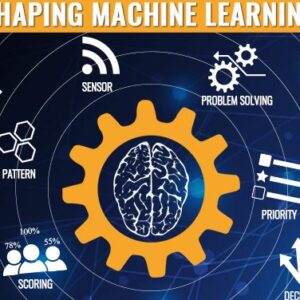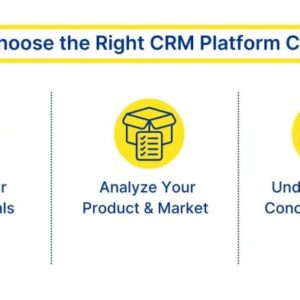The Future of CRM: How AI is Revolutionizing Customer Relationship Management. Forget clunky spreadsheets and endless manual tasks – AI is rewriting the rules of customer engagement. We’re talking smarter lead scoring, hyper-personalized experiences, and predictions that help you stay ahead of the curve. This isn’t just about efficiency; it’s about building deeper, more meaningful relationships with your customers, boosting loyalty, and ultimately, driving serious revenue growth. Get ready to ditch the old-school CRM and embrace the AI-powered future.
This deep dive explores how artificial intelligence is transforming every aspect of CRM, from automating mundane tasks to providing unparalleled insights into customer behavior. We’ll uncover the key features, address potential challenges, and peek into the exciting trends shaping the future of customer relationship management. Prepare for a game-changing shift in how businesses connect with their customers.
AI-Powered CRM Features
Forget dusty spreadsheets and manual data entry. AI is injecting a serious dose of awesomeness into CRM, transforming how businesses understand and interact with their customers. We’re talking about smarter systems, predictive capabilities, and personalized experiences – all powered by the magic of artificial intelligence. This section dives into the specific features that are changing the CRM game.
AI enhances lead scoring and prioritization by analyzing vast amounts of data to identify the most promising prospects. Instead of relying on gut feeling, sales teams can now focus their energy on leads with the highest probability of conversion. This leads to increased efficiency and improved sales outcomes.
AI-Driven Lead Scoring and Prioritization
AI algorithms analyze various data points – website activity, email engagement, social media interactions, and even demographic information – to assign a score to each lead. Higher scores indicate a greater likelihood of conversion. This allows sales teams to prioritize their efforts, contacting high-potential leads first and nurturing lower-scoring leads strategically. For instance, a lead who consistently downloads white papers, attends webinars, and engages with your social media posts will receive a higher score than someone who only visited your website once. This data-driven approach significantly improves sales efficiency and conversion rates.
AI-Driven Predictive Analytics in Customer Behavior Forecasting
Predictive analytics uses historical data and machine learning to forecast future customer behavior. This allows businesses to anticipate customer needs, personalize marketing campaigns, and proactively address potential issues. Imagine predicting customer churn – identifying at-risk customers before they leave. Or, predicting which products a customer is most likely to purchase next, allowing for targeted offers and personalized recommendations. Companies like Netflix leverage this extensively to suggest movies and shows you might enjoy based on your viewing history.
AI-Powered Chatbots Enhancing Customer Service Interactions
AI-powered chatbots are revolutionizing customer service by providing instant, 24/7 support. These chatbots can handle routine inquiries, troubleshoot common issues, and even escalate complex problems to human agents. Think of it as having a tireless, always-available customer service representative who can answer questions instantly and accurately, freeing up human agents to focus on more complex issues. For example, a chatbot can answer simple questions about shipping times, track orders, or provide basic product information, allowing human agents to focus on resolving more intricate customer problems.
Comparison of Traditional CRM vs. AI-Enhanced CRM
| Feature | Traditional CRM | AI-Enhanced CRM | Example |
|---|---|---|---|
| Lead Scoring | Manual, rule-based | Automated, AI-driven, predictive | Manual scoring based on simple criteria vs. AI analyzing multiple data points to predict conversion probability. |
| Sales Forecasting | Based on historical data and sales rep estimations | Predictive analytics using machine learning algorithms | Simple extrapolation of past sales vs. AI predicting future sales based on market trends and customer behavior. |
| Customer Service | Primarily human agents | AI-powered chatbots and automated responses | Waiting on hold for a human agent vs. instant answers from a chatbot for basic questions. |
| Customer Segmentation | Manual grouping based on simple demographics | AI-driven segmentation based on behavioral data and preferences | Segmenting customers by age and location vs. segmenting by purchase history, website activity, and engagement levels. |
Automation and Efficiency Gains

Source: founderjar.com
AI is transforming CRM, not just by adding smart features, but by fundamentally changing how teams work. The ability to automate repetitive tasks frees up valuable time and resources, allowing sales, marketing, and customer service teams to focus on higher-value activities that directly impact revenue and customer satisfaction. This shift towards automation isn’t just about saving time; it’s about strategically redeploying human talent to where it matters most.
AI-driven automation in CRM significantly boosts team productivity by streamlining workflows and reducing the burden of manual processes. Imagine a world where data entry, email follow-ups, and lead qualification happen automatically, leaving your team to concentrate on building genuine relationships with clients and closing deals. This isn’t science fiction; it’s the reality for many businesses already leveraging AI-powered CRM systems. The result? Happier, more productive employees and a significant return on investment.
AI-Driven Task Automation Examples
Automating repetitive tasks frees up valuable employee time, allowing them to focus on more strategic initiatives. This translates to improved efficiency and increased revenue. Consider a sales team spending hours each day manually entering lead data. With AI, this process becomes automated, significantly reducing errors and freeing up time for sales representatives to focus on nurturing leads and closing deals. Similarly, AI can automate personalized email follow-ups, ensuring timely communication and improving customer engagement.
- Lead Scoring and Qualification: AI algorithms analyze lead data to automatically prioritize high-potential leads, allowing sales teams to focus their efforts on the most promising opportunities.
- Data Entry: AI can automatically extract information from various sources, such as forms and emails, and populate CRM databases, reducing manual data entry and minimizing errors.
- Email Marketing Automation: AI personalizes email campaigns based on customer behavior and preferences, increasing engagement and conversion rates. For example, an e-commerce platform could send automated emails recommending products based on a customer’s browsing history.
- Appointment Scheduling: AI-powered scheduling tools can automatically find optimal times for meetings based on the availability of both parties, streamlining the process and improving time management.
- Customer Service Chatbots: AI-powered chatbots handle routine customer inquiries, freeing up human agents to focus on more complex issues. A bank, for instance, could use a chatbot to answer frequently asked questions about account balances or transaction history.
Case Studies: Increased Efficiency Through AI
Several companies have demonstrated significant efficiency gains by integrating AI into their CRM systems. One example is a large telecommunications company that reduced its customer service response time by 40% by implementing an AI-powered chatbot to handle routine inquiries. This allowed human agents to focus on more complex issues, resulting in improved customer satisfaction and reduced operational costs. Another company, a SaaS provider, saw a 25% increase in sales conversion rates after implementing AI-driven lead scoring and qualification. This demonstrates the tangible impact of AI on key business metrics. These aren’t isolated incidents; many businesses across various industries are seeing similar improvements.
Personalized Customer Experiences
Forget the generic email blasts and one-size-fits-all marketing strategies. AI is transforming CRM into a hyper-personalized engine, allowing businesses to understand and cater to individual customer needs like never before. This level of personalization isn’t just about making customers feel special; it’s about boosting engagement, driving conversions, and fostering lasting loyalty.
AI enables a deep dive into customer data, uncovering hidden patterns and preferences that human analysts might miss. This granular understanding fuels highly targeted marketing campaigns and significantly improves customer satisfaction.
AI-Driven Personalized Marketing Campaigns
AI analyzes vast amounts of customer data – from browsing history and purchase patterns to social media activity and customer service interactions – to create detailed customer profiles. These profiles then inform the creation of hyper-personalized marketing campaigns. For example, an e-commerce platform might use AI to identify customers who have recently viewed hiking boots and send them targeted ads featuring new hiking socks or waterproof jackets. This targeted approach maximizes the effectiveness of marketing spend by focusing on customers most likely to convert. Furthermore, AI can optimize the timing and frequency of these campaigns, ensuring the message reaches the customer at the most opportune moment. This contrasts sharply with traditional methods that often relied on broad demographics and resulted in wasted marketing efforts.
AI-Powered Product Recommendations and Offers
Think Netflix’s “Because you watched…” suggestions, but on steroids. AI algorithms within CRM systems analyze customer data to predict which products or services they’re most likely to be interested in. This goes beyond simple “customers who bought this also bought that” recommendations. AI can consider factors like purchase history, browsing behavior, demographics, and even current events to suggest highly relevant and personalized offers. A luxury car dealership, for instance, might use AI to identify customers who recently viewed a specific model but haven’t yet made a purchase. The system could then send them a personalized offer including a test drive, financing options tailored to their credit profile, or information about upcoming exclusive events.
AI-Enhanced Customer Segmentation for Targeted Outreach
Gone are the days of crude customer segmentation based on broad demographics. AI empowers businesses to create incredibly granular segments based on a multitude of factors. Instead of simply targeting “women aged 25-35,” AI can identify customers with specific interests, purchase behaviors, and even emotional responses to marketing materials. This allows for hyper-targeted outreach that resonates deeply with each segment. A cosmetics company, for example, might segment customers based on skin type, preferred product categories, and brand loyalty, enabling them to deliver tailored product recommendations and promotions that are much more effective than generic campaigns.
Customer Experience: Before and After AI Integration
The impact of AI on customer experience is transformative. Here’s a comparison:
- Before AI: Generic marketing campaigns, delayed responses to inquiries, irrelevant product recommendations, difficulty in identifying high-value customers.
- After AI: Personalized marketing messages, immediate and helpful responses, relevant product recommendations, proactive identification of high-value customers, improved customer service interactions through AI-powered chatbots.
Data Analysis and Insights
AI is transforming how businesses understand their customers. No longer are CRM systems just repositories of contact information; they’re becoming powerful engines of insight, thanks to the analytical prowess of artificial intelligence. AI algorithms sift through vast amounts of CRM data – uncovering hidden patterns, predicting future behavior, and ultimately, driving smarter business decisions. This allows companies to move beyond reactive customer service and into proactive, personalized engagement.
AI algorithms extract valuable insights from CRM data by employing sophisticated statistical methods and machine learning techniques. These algorithms can identify correlations between seemingly disparate data points – purchase history, website activity, customer service interactions – to build a comprehensive picture of individual customer behavior and overall market trends. This granular level of understanding allows businesses to tailor their strategies with unprecedented precision.
AI-Driven Customer Churn Prediction
Predicting customer churn is crucial for business sustainability. AI excels at this by analyzing historical data to identify patterns and risk factors associated with customer attrition. Machine learning models, specifically those based on techniques like survival analysis and logistic regression, are trained on past customer data (including demographics, purchase frequency, engagement levels, and support interactions). These models then score current customers based on their likelihood of churning, allowing businesses to proactively engage at-risk customers with targeted retention strategies – personalized offers, loyalty programs, or proactive customer service outreach. For example, a telecommunications company might use AI to identify customers who are consistently using less data than their plan allows, signaling potential dissatisfaction and a higher risk of churn. The company could then offer them a lower-cost plan or additional services to retain them.
Sentiment Analysis of Customer Feedback
Understanding customer sentiment is paramount. AI-powered sentiment analysis tools automatically analyze customer feedback from various channels – surveys, social media, emails, and reviews – to gauge overall customer satisfaction and identify areas for improvement. These tools go beyond simple searches, employing natural language processing (NLP) to understand the context and nuances of language. For instance, a sentiment analysis algorithm can differentiate between “The product is okay” (neutral sentiment) and “The product is okay, but the customer service was terrible” (negative sentiment). This allows businesses to address negative feedback promptly and improve products or services based on direct customer input. A retail company, for example, might use sentiment analysis to identify recurring negative feedback about slow shipping times, prompting them to optimize their logistics.
AI-Enhanced Data Visualization in CRM Dashboards
Imagine a CRM dashboard that dynamically adapts to your needs, presenting only the most relevant and insightful data in a clear, intuitive way. This is the power of AI-enhanced data visualization. Instead of static charts and graphs, AI can create interactive dashboards that automatically highlight key trends, anomalies, and potential opportunities. For example, a heatmap could dynamically show geographical areas with high customer churn rates, allowing sales teams to focus their efforts on those regions. Another visualization could show a network graph illustrating customer relationships, highlighting influential customers or communities. A predictive model could be overlaid onto a sales funnel, showing the likelihood of conversion at each stage. The overall effect is a dashboard that is not just informative but also actionable, guiding business decisions in real-time. This sophisticated visualization goes beyond simply presenting data; it actively interprets it, making complex information accessible and understandable for everyone, from executives to frontline employees.
Challenges and Considerations: The Future Of CRM: How AI Is Revolutionizing Customer Relationship Management

Source: co.id
The integration of AI into CRM, while promising incredible advancements, isn’t without its hurdles. Ethical concerns, technical difficulties, and the ongoing need for human oversight all demand careful consideration to ensure a responsible and effective implementation. Ignoring these challenges could lead to negative consequences, undermining the very benefits AI promises to deliver.
AI’s impact on customer data necessitates a robust approach to privacy and security. The sheer volume of data collected and analyzed raises significant ethical questions.
Data Privacy and Security
The use of AI in CRM involves processing vast quantities of sensitive customer data, raising concerns about privacy breaches and misuse. Regulations like GDPR in Europe and CCPA in California mandate stringent data protection measures. AI systems must be designed with privacy by design principles, ensuring data minimization, anonymization where possible, and robust security protocols to prevent unauthorized access or data leaks. A breach of customer trust, resulting from a data security incident, could severely damage a company’s reputation and lead to hefty fines. For example, a hypothetical scenario of a CRM system being hacked, exposing customer financial information, would result in significant legal and reputational damage, illustrating the critical need for robust security measures.
Integration Challenges
Integrating AI into existing CRM systems can be complex and costly. Many businesses use legacy systems that may not be compatible with modern AI technologies. This often requires significant upgrades or even complete system replacements, leading to substantial upfront investment and potential disruption to ongoing operations. Furthermore, the lack of skilled personnel to implement and maintain AI-powered CRM systems presents another challenge. Businesses need to invest in training and recruitment to bridge this skills gap. For instance, a company attempting to integrate AI into a decades-old CRM system might face difficulties in data migration, system compatibility issues, and a shortage of data scientists to manage the AI implementation.
Human Oversight and Intervention
While AI can automate many CRM tasks, human oversight remains crucial. AI algorithms, even advanced ones, are not infallible. They can make mistakes, leading to incorrect predictions or biased outcomes. Human intervention is necessary to review AI-generated insights, identify errors, and ensure ethical and fair treatment of customers. Furthermore, human empathy and nuanced understanding are often required to address complex customer issues that AI may struggle to comprehend. Consider a scenario where an AI-powered chatbot misinterprets a customer’s emotional distress, leading to a negative customer experience. Human intervention could have salvaged the situation by providing empathetic support and resolving the issue effectively.
Best Practices for Responsible AI Implementation, The Future of CRM: How AI is Revolutionizing Customer Relationship Management
Implementing AI responsibly in CRM requires a multi-faceted approach. This includes establishing clear ethical guidelines, ensuring data transparency and accountability, and implementing robust security measures. Regular audits and evaluations of AI systems are essential to detect and mitigate biases and ensure compliance with regulations. Investing in employee training on AI ethics and responsible data handling is also crucial. Companies should prioritize building trust with customers by being transparent about how AI is used in their CRM systems and providing clear mechanisms for customers to access, correct, or delete their data. For example, providing customers with clear explanations of how AI personalizes their experience, along with the ability to opt out of personalized features, demonstrates a commitment to responsible AI use.
Future Trends in AI-Driven CRM
The evolution of AI in CRM is far from over. We’re only scratching the surface of what’s possible, and the next few years promise a dramatic reshaping of how businesses interact with their customers. Expect even more sophisticated tools, deeper integration with other technologies, and a fundamental shift in the roles of CRM professionals.
The integration of increasingly advanced AI capabilities into CRM systems will lead to significant advancements in customer relationship management. This involves not only enhancing existing functionalities but also creating entirely new ways to interact with customers and manage data.
Natural Language Processing (NLP) Advancements
NLP is rapidly becoming a cornerstone of AI-powered CRM. Beyond basic chatbots, we’re seeing the emergence of systems that can understand nuanced customer sentiment, interpret complex queries, and even proactively anticipate customer needs based on language patterns. For example, imagine a CRM system that automatically identifies frustrated customers based on their email tone and flags them for immediate attention from a human agent, preventing potential churn. This allows for more efficient and personalized responses to customer queries, leading to increased satisfaction and retention. Future developments will likely include more sophisticated contextual understanding and the ability to analyze unstructured data sources like social media posts and customer reviews to gain a comprehensive view of customer sentiment.
AI Integration with Blockchain and IoT
The convergence of AI with other transformative technologies holds immense potential for CRM. Blockchain, for instance, can enhance data security and transparency within CRM systems, ensuring customer data privacy and building trust. Imagine a system where customer data is securely stored and shared across departments using blockchain technology, with complete audit trails and minimized risk of data breaches. Simultaneously, the Internet of Things (IoT) offers a wealth of real-time customer data. Integrating AI with IoT data allows for hyper-personalized experiences. For example, a smart home device could automatically trigger a CRM action based on user behavior, like sending a targeted product recommendation after detecting low stock of a frequently used item. This proactive approach can greatly enhance customer engagement and loyalty.
The Evolving Role of CRM Professionals
The rise of AI doesn’t mean the end of human CRM professionals; instead, it reshapes their roles. Rather than focusing on manual data entry and repetitive tasks, CRM professionals will become strategic advisors, data analysts, and technology integrators. They will need to develop expertise in interpreting AI-generated insights, designing AI-driven workflows, and ensuring the ethical and responsible use of AI in customer interactions. This shift requires upskilling and reskilling initiatives to prepare the workforce for these new responsibilities. Think of CRM professionals becoming AI trainers, fine-tuning models to better understand specific customer segments and business needs.
A Timeline for AI in CRM (2024-2034)
The next decade will witness a significant evolution in AI-driven CRM. We can project the following key milestones:
- 2024-2026: Widespread adoption of advanced NLP capabilities in chatbots and customer service platforms. Increased focus on personalization through AI-driven recommendations and targeted marketing.
- 2027-2029: Integration of AI with blockchain and IoT technologies becomes more prevalent, leading to enhanced data security and hyper-personalized customer experiences. Predictive analytics becomes significantly more accurate and sophisticated.
- 2030-2034: AI-driven CRM systems become proactive and anticipatory, predicting customer needs and automating complex processes. The emergence of AI-powered virtual assistants capable of handling increasingly complex customer interactions. The role of human CRM professionals shifts towards strategic management and AI oversight.
This timeline represents a plausible trajectory, influenced by current technological advancements and market trends. The actual pace of adoption may vary depending on factors like technological breakthroughs, regulatory changes, and overall economic conditions. However, the overall trend towards greater AI integration in CRM is undeniable.
Epilogue
The integration of AI into CRM isn’t just a trend; it’s a necessity for businesses aiming to thrive in today’s hyper-competitive landscape. By leveraging AI’s power, companies can unlock unprecedented levels of efficiency, personalize customer experiences like never before, and make data-driven decisions that fuel growth. While challenges exist, the potential rewards far outweigh the risks. Embracing AI in your CRM strategy isn’t just about keeping up – it’s about leading the charge into a future where customer relationships are smarter, stronger, and more profitable.



